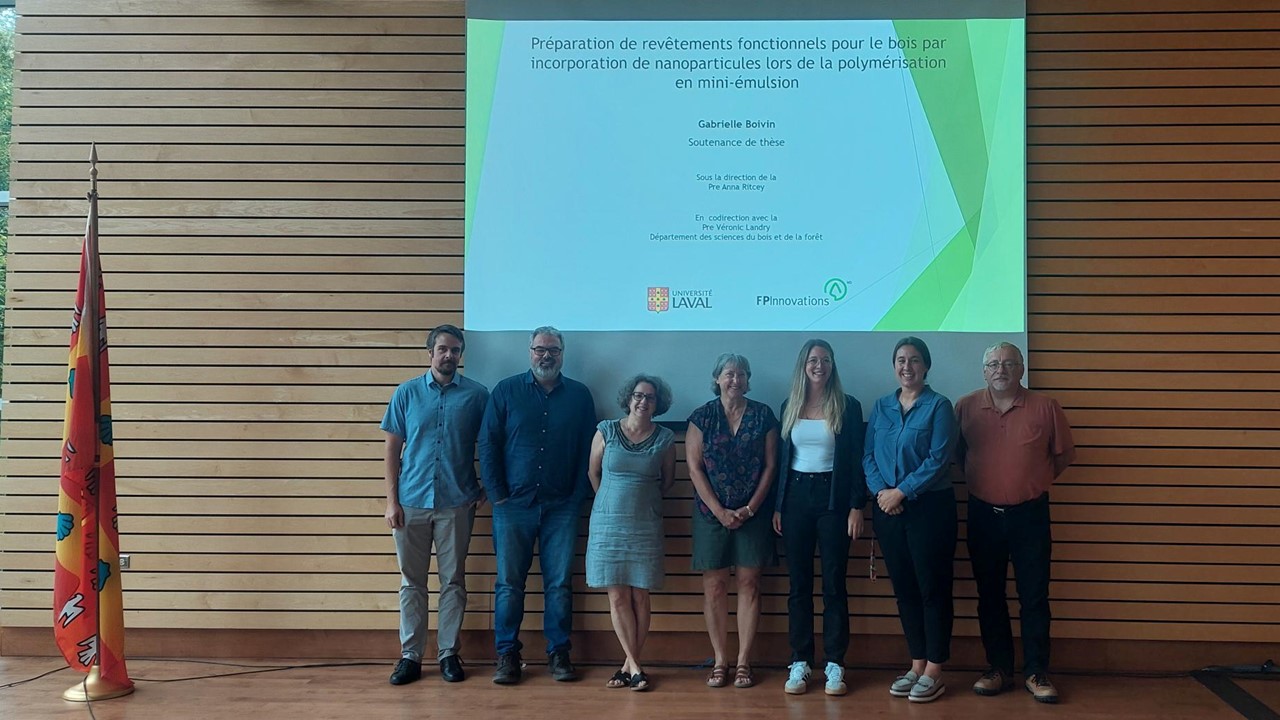Congratulations to Gabrielle Boivin on her successful PhD defense!
Congratulations to Gabrielle Boivin for successfully defending her doctoral thesis in chemistry on September 19, 2024, under the supervision of Anna Ritcey (Department of Chemistry, Université Laval) and co-supervision of Véronic Landry (Faculty of Forestry, Geography, and Geomatics, Université Laval). Her thesis, titled « Preparation of Functional Coatings for Wood by Incorporating Nanoparticles During Mini-Emulsion Polymerization », makes a significant contribution to innovation in the field of bio-based materials and wood protection, exploring advanced techniques to enhance the durability and performance of coatings.
Congratulations to Gabrielle for this remarkable milestone in her academic journey! We wish her a promising future filled with scientific discoveries and professional success.
The jury members were:
Paul A. Johnson, Jury Chairman and Secretary – Department of Chemistry, Laval University
Jean-Yves Bergeron, external examiner- Kemitek
Josée Brisson, examiner- Department of Chemistry, Laval University
Jean-François Morin, examiner- Department of Chemistry, Laval University
Anna Ritcey, Research Director- Department of Chemistry, Laval University
Véronic Landry, Co-Research Director- Department of Wood and Forest Sciences, Laval University

Thesis title: Preparation of functional coatings for wood by incorporating nanoparticles during mini-emulsion polymerization
Abstract
Exterior wood products protected with translucent finishes require frequent maintenance and have a shorter service life than competitive materials, which disadvantages wood in outdoor applications. Developing high-performance, durable, and low-maintenance finishing products is essential. This PhD thesis investigates using mini-emulsion polymerization to develop translucent wood finishes with antifungal and photodegradation-resistant properties, by encapsulating nanoparticles in the polymer matrix.
Silver and zinc oxide nanoparticles were synthesized and encapsulated in acrylic latexes by mini-emulsion polymerization. The antifungal properties of finishes prepared from the synthesized latexes were evaluated against strains of Sclerophoma pityophila, Epicoccum nigrum and Aureobasidium pullulans. Latexes containing silver nanoparticles (AgNPs) were shown to limit the growth of S. pityophila and E. nigrum as effectively as the reference formulation after eight weeks. However, it was more difficult to control the growth of the A. pullulans strain.In addition, the thesis reports on the influence of the type of initiator (hydrophobic or hydrophilic) on the incorporation and distribution of AgNPs in the synthesized polymer particles, as well as on the antifungal properties.The influence of initiator type on the leaching of encapsulated AgNPs by miniemulsion polymerization was also investigated.
This thesis work shows that mini-emulsion polymerization can be used to prepare acrylic latexes resistant to black-stain fungi by encapsulating AgNPs. Mini-emulsion polymerization could also be used as a potential means of reducing the leaching of additives into the environment.

